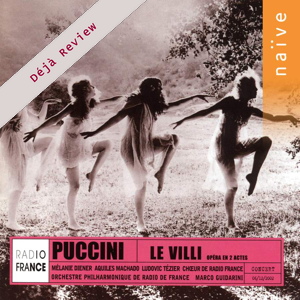
Déjà Review: this review was first published in September 2003 and the recording is still available.
Giacomo Puccini (1858-1924)
Le Villi, opera in two acts to a libretto by Ferdinando Fontana (1884)
Anna – Mélanie Diener (soprano)
Roberto – Aquiles Machado (tenor)
Guglielmo – Ludovic Tézier (baritone)
Reciter – Sylvie David
Choeur de Radio France
Orchestre Philharmonique de Radio France/Marco Guidarini
rec. live, 28 March 2002, Salle Olivier Messiaen, Paris
naïve V4958 [68]
Having conducted the work myself in 1985 (in a coupling with Puccini’s next, second opera Edgar) I find this the most satisfactory way of approaching the work, purely through its music. It’s a kind of operatic version of the ballet La Sylphide, an ingredient-packed drama of Wilis, who are beautiful spirit maidens who dance you to death, a remorseful tenor, vengeful father, and a dramatic soprano (20 years later mine, Elizabeth Byrne, is singing Brünnhilde in the current Scottish Opera Ring cycle, so you can see what sort of voice is required here). The problem with this opera is that the most dramatic parts occur offstage (Roberto’s seduction and Anna’s death), and they are only related to its bemused audience by a spoken narration, possibly in a language they cannot understand. Instead all operatic clichés have a field day, such as the opening chorus of village peasants, the massive prayer scene to close the first act in a full ensemble. Despite such stereotypes, there is also a hint of Puccini to come (this is a student work), for Roberto is surely a prototype for Cavaradossi in Tosca and even Calaph in Turandot, for his aria is hugely intense, while Anna, the quintessential suffering soprano, is any of Madame Butterfly, Liù or Mimi in the making, and the third character, her father Guglielmo, is a typically wounded operatic father (Verdi’s Rigoletto or Germont père models here).
This recording does the work full justice and makes no attempt to cover up its youthful composer’s weaknesses at this stage of his career. Judging by the excellent pacing and lush balance here, the harmonic language and melodic style could be none other than Puccini, while the small cast and large orchestra enter into the spirit of the piece from the outset. Not just for anoraks, this is a marvellous introduction to Puccini.
Christopher Fifield
Help us financially by purchasing from




















